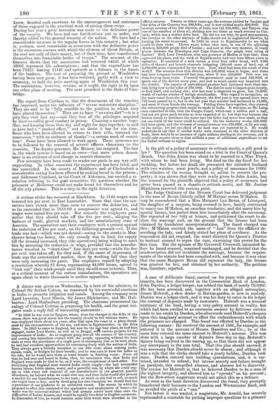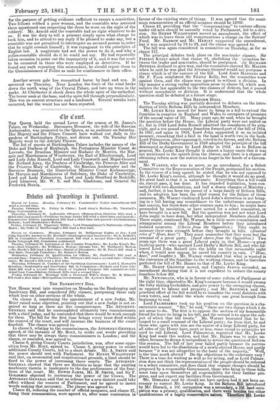A case of deliberate fraud, carried on for years with
great per- tinacity, has been discovered in the Commercial Bank of London. John Darden, a ledger-keeper, has robbed the bank of nearly 70,000/. He has been arrested, and, together with an alleged accomplice, James Holcroft, a shoe dealer in Hatton-garden, is now in custody. Darden was a ledger-clerk, and it was his duty to enter in his ledger the amount of deposits made by customers. Holcroft was a nominal customer of the bank, having a very paltry account in reality, but which had been swelled to an enormous amount by fictitious entries made to his credit by Darden, who afterwards used Holcroft's cheques upon this imaginary account to effect the embezzlements with which the prisoners are charged. This fraud was effected by Burden in the following; manner : He received the amount of 156/., for.example, and entered it to the account of Messrs. Hamilton and Co.; he at the same time entered the same amount to Holcroft's account. This was done with a large number of deposits from day to day, Holcroft's figures being omitted in the casting up, so that there did not appear any discrepancy in the sum total. That this plan should succeed, it was necessary that Durden should never be absent; and although it was a rule that the clerks should take a yearly holiday, Burden took none. Burden entered into building speculations, and, it is sur- mised, intended to refund; but intense anxiety and failure brought on paralysis, this compelled absence, and absence led to discovery. The excuse for Holcroft is, that he believed Darden to be a man of the highest integrity, and allowed him to "operate" on his account; but the Bow-street magistrate would not admit this as a defence. As soon as the bank directors discovered the fraud, they promptly transferred their business to the London and Westminster Bank, and so avoided the perils of a "run." Not before it was wanted, a magistrate, Mr. Arnold, has severely reprimanded a constable for putting improper questions to a prisoner
for the purpose of getting evidence sufficient to ensure a conviction. Two fellows robbed a poor woman, and the constable who arrested them questioned one respecting the dress he wore on the night of the robber?: Mr. Arnold said the constable had no right whatever to do so. It was his duty to tell a prisoner simply upon what charge he took him, and to attend to any reply if he pleased to make any, but a constable was not permitted to interrogate an accused person in order that he might commit himself; it was repugnant to the principles of English law. A magistrate had not the power to do it, and why a police-constable should do it he could not say. He had repeatedly taken occasion to point out the impropriety of it, and it was the more to be censured in those who were employed as detectives. If he found any such repeating, this misconduct, he should report them to the Commissioners of Police as unfit for continuance in their office.































 Previous page
Previous page